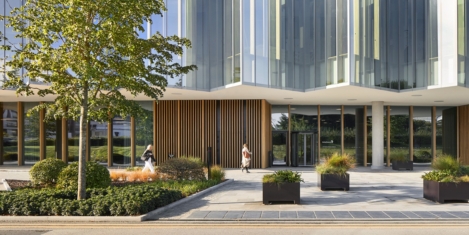November 11, 2014
Current issue of Work&Place explores intersecting worlds of people, place and tech
 As we prepare the upcoming issue of Work&Place (don’t forget to subscribe on our homepage), a reminder that the September issue of Work&Place is available to download or view as a PDF or now in an online edition. Amongst this issue’s highlights are: Ian Ellison’s retrospective of last Summer’s Workplace Strategy Summit; Jim Ware offers up a case study of workplace transformation at NEF from the perspective of the firm’s CEO; Agustin Chavez and Laurie Aznavoorian consider how the workplace can help firms to manage knowledge; David Karpook meanwhile characterises the role of the facilities manager as akin to that of a stage manager; Wim Pullen explores the multi-generational workplace using empirical evidence; Erik Jaspers looks at how workers are colonising the world’s cities; Pawel Lenart and Dominika Kowalska report on how one specific country – Poland – has seen a transformation in the way it creates and uses workplaces over the past twenty years; and, on related themes Nancy Sanquist explains how IFMA is driving the agenda on urban FM and Charles Marks looks at how the UK’s regions are looking to capitalise on the Smart Cities movement.
As we prepare the upcoming issue of Work&Place (don’t forget to subscribe on our homepage), a reminder that the September issue of Work&Place is available to download or view as a PDF or now in an online edition. Amongst this issue’s highlights are: Ian Ellison’s retrospective of last Summer’s Workplace Strategy Summit; Jim Ware offers up a case study of workplace transformation at NEF from the perspective of the firm’s CEO; Agustin Chavez and Laurie Aznavoorian consider how the workplace can help firms to manage knowledge; David Karpook meanwhile characterises the role of the facilities manager as akin to that of a stage manager; Wim Pullen explores the multi-generational workplace using empirical evidence; Erik Jaspers looks at how workers are colonising the world’s cities; Pawel Lenart and Dominika Kowalska report on how one specific country – Poland – has seen a transformation in the way it creates and uses workplaces over the past twenty years; and, on related themes Nancy Sanquist explains how IFMA is driving the agenda on urban FM and Charles Marks looks at how the UK’s regions are looking to capitalise on the Smart Cities movement.




























March 5, 2014
Innovate or die? Why facilities management must embrace change to survive
by Demitri Maldonado • Comment, Facilities management
According to recent reports on workplace, facilities management and corporate real estate, the support services sector needs to change. Some even say it needs to innovate or die. That might be a little harsh, but the current model that the majority of FM service providers work to and that their clients take for granted is tired and has not kept pace with the evolving business environment. Zurich Insurance’s report of late 2012 into CRE & FM said the sector was at a cross roads; in 2013 Jones Lang LaSalle said something similar and picked out five global trends to which CRE and FM had to respond. IFMA & CBRE have taken a similar line, but are more specific – namely FM had to embrace its softer side, focus on people skills and develop them to ensure success. (more…)